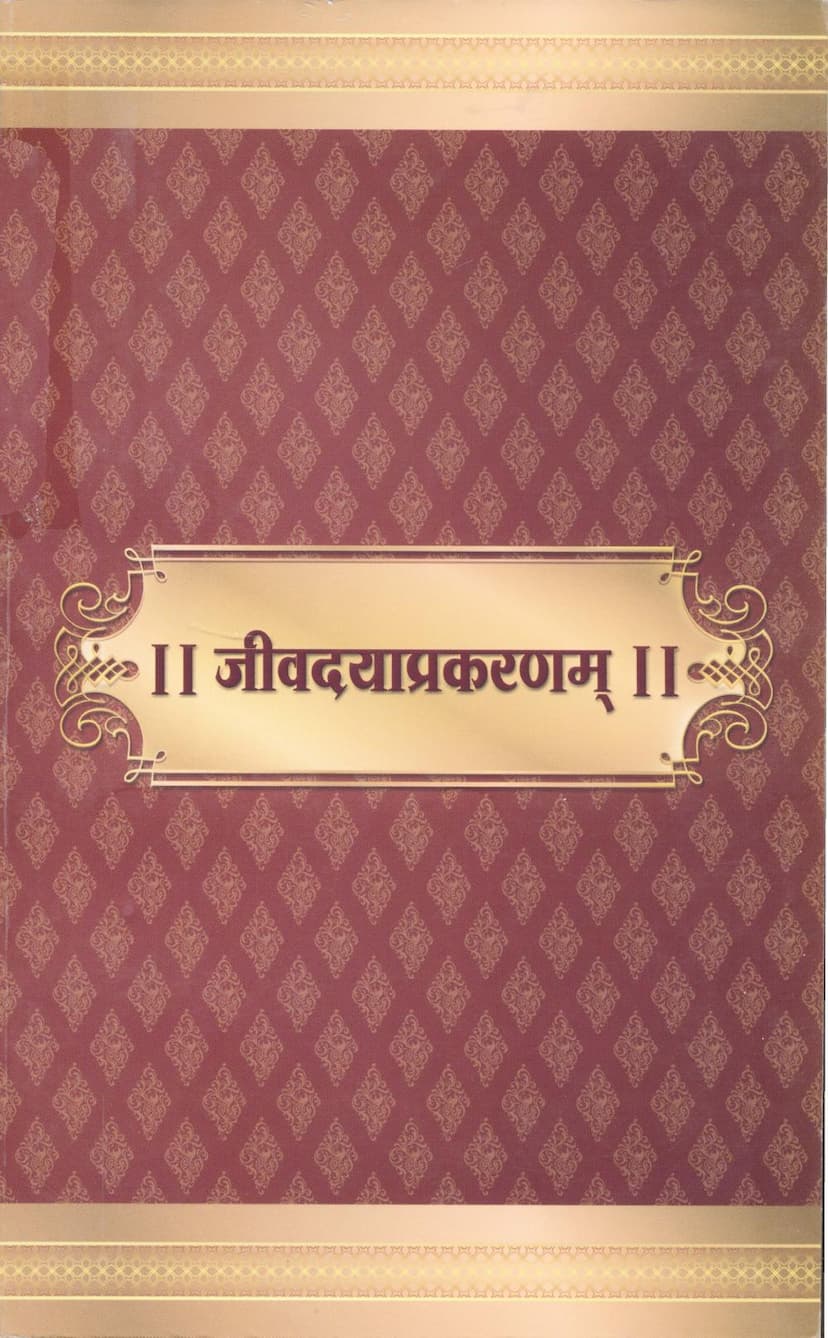Jivdaya Prakaranam
Added to library: September 2, 2025

Summary
This Jain text, "Jivdaya Prakaranam" (जीवदयाप्रकरणम्), authored by Kalyanbodhisuri, published by Shri Jinshasan Aradhak Trust, is a profound exploration of Jivdaya (जीवदया), which translates to compassion or kindness towards all living beings, a central tenet of Jainism. The work is presented as a commentary or explanation (vritti) called "Dayopanishad" on the original Prakrit text.
Here's a comprehensive summary of its key aspects based on the provided pages:
Core Message and Purpose:
- Centrality of Jivdaya: The text emphasizes that Jivdaya is not just an ethical principle but the very essence of Jainism, the heart of the faith. It is presented as the foundation for all other virtues and practices.
- Path to Happiness and Liberation: Jivdaya is described as the root cause of all happiness and the means to overcome all sorrows. It is the direct path to spiritual liberation (Nirvana).
- Transformative Power: The text aims to soften hardened hearts, inspire those attached to the material world to embrace restraint, and guide those who are already restrained towards even greater purity in their practice.
- Reverence for the Text: The commentary highlights the text's profound wisdom, capable of melting even the hardest hearts and guiding practitioners towards higher spiritual states.
Structure and Content:
- Original Text: The original work is in Prakrit and consists of approximately 115 verses (gathas).
- Commentary (Dayopanishad): The current edition features a newly created Sanskrit commentary (vritti) and a vernacular translation (bhavanuvad) by Acharya Vijay Kalyanbodhisuri.
- Scholarly Approach: The original text was researched using three manuscripts, including palm-leaf manuscripts from the Bhandarkar Institute in Pune.
- Key Themes Explored:
- Jivdaya as the Root of Dharma: The text asserts that true religious practice (dharma) stems from Jivdaya.
- Jivdaya and other Vows: It explains how other Jain vows like truthfulness (satya), non-stealing (asteya), chastity (brahmacharya), and non-possession (aparigraha) are all deeply connected to and supported by Jivdaya. For instance, speaking truth is linked to not causing harm through falsehood.
- Consequences of Violence vs. Compassion: The text vividly illustrates the suffering caused by violence and the immense joy and merit gained through acts of compassion and non-violence (ahimsa).
- The Nature of Suffering: A significant portion of the text (pages 58-89) is dedicated to a detailed and graphic description of the tortures and suffering experienced in various hells (naraka), emphasizing that such suffering arises from past violence and uncompassionate actions. It also depicts the hardships faced in the animal realm (tiryan), the human realm (manushya), and even the difficulties within the womb.
- The Importance of Human Birth: The text stresses the rarity and value of human birth, highlighting how it provides the best opportunity for spiritual progress and how many fail to utilize it due to attachment, ignorance, or focusing on mundane pursuits.
- Jivdaya as the Path to Liberation: It concludes by reiterating that Jivdaya, along with other virtues like truthfulness, non-stealing, good conduct, patience (kshaanti), and control of the senses (indriya nigrah), are the true foundations of dharma and lead to liberation.
Author and Lineage:
- Author: Acharya Vijay Kalyanbodhisuri, a disciple of the esteemed Acharya Vijay Hemchandrasurishwarji.
- Lineage: The work is dedicated to the lineage of revered Jain Acharyas, including Param Gurudev Shri Premsurishwarji, Acharya Shri Bhuvanbhanusurishwarji, Pandit Shri Padmavalijii, and Acharya Shri Hemchandrasurishwarji, acknowledging their profound influence and blessings.
Key Philosophical Points:
- "Ahinsa Param Dharma": The underlying message reinforces the Jain principle that non-violence is the supreme religion.
- Cause and Effect (Karma): The text emphasizes the law of karma, showing how actions (especially those involving harm) directly lead to suffering, and how compassionate actions lead to happiness and spiritual merit.
- Self-Realization: True wisdom (jnana) is presented as inseparable from compassion, as one cannot truly understand the interconnectedness of life without practicing Jivdaya.
- The Impermanence of Life: The text repeatedly highlights the fleeting nature of life, the inevitability of death, and the suffering associated with worldly attachments, urging readers to prioritize spiritual endeavors.
- The Rarity of True Virtue: The commentary points out that even ascetic practices performed without true understanding or compassion are ultimately fruitless, like the efforts of a blind person trying to guide others.
Overall Tone and Significance:
- Motivational and Illuminating: The text is written to inspire, educate, and guide its readers towards a life of deep compassion and spiritual awareness.
- Comprehensive Exposition: The commentary provides a detailed explanation of each verse, delving into its philosophical and practical implications.
- Respect for Preceding Acharyas: The work is a testament to the author's deep respect for the tradition and the profound teachings of past Jain masters.
In essence, "Jivdaya Prakaranam" as presented with the "Dayopanishad" commentary is a comprehensive guide to understanding and practicing Jivdaya, presenting it as the ultimate key to happiness, spiritual progress, and liberation within the Jain tradition.